
Waterloo’s first gender equity hackathon draws women hackers
50 per cent of participants at #Equithon2017 were women looking for solutions to everything from gendered racism to mental health

50 per cent of participants at #Equithon2017 were women looking for solutions to everything from gendered racism to mental health
By Candace Harrington Associate Director of Advancement, Faculty of Mathematics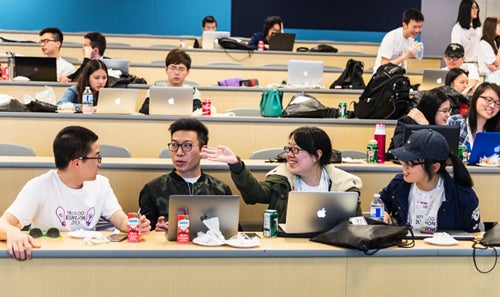
It was a hackathon with a difference. Instead of a round-the-clock event dominated by male hackers - Waterloo’s first Equithon was structured across three days with no overnights - and 50 per cent of the hackers were women.
“I have been in the industry for 20 years and I have never seen an event like this. It is exciting to see the [gender] ratio in this room, the diversity,” said Lori Lalonde, Microsoft technical evangelist.
The Equithon took place from May 5-7 in support of Waterloo’s commitment to the UN Women’s HeForShe IMPACT initiative. One hundred hackers developed innovative solutions to address equity issues around five themes: Poverty and Equity, Gendered Racism, Women Empowerment, Mental Health, and Physical Disabilities.
Mentors from across the five fields joined the students to share their experiences, expertise, and insights. The event attracted the attention and participation of mentors from a number of equity organizations across Waterloo region, including Bridges to Belonging, KidsAbility, YWCA, Mary’s Place, and the University of Waterloo’s Peace and Conflict program.
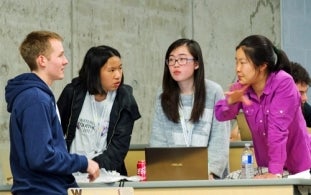 “I wish that the tech industry looked like this audience,” said Jo Atlee, a computer science professor at Waterloo and Director of Women in Computer Science. “The average representation in industry is less than 20 per cent. That’s disappointing because these are financially rewarding careers that everyone deserves access to.”
“I wish that the tech industry looked like this audience,” said Jo Atlee, a computer science professor at Waterloo and Director of Women in Computer Science. “The average representation in industry is less than 20 per cent. That’s disappointing because these are financially rewarding careers that everyone deserves access to.”
The team’s solutions ranged from technology to help the elderly live independently, to a crowdsourcing solution to report accessibility problems in specific locations and facial recognition applications that help locate missing people through social media.
In her keynote address, Kitchener Waterloo MPP Catherine Fife said equity is about fairness - ensuring the same opportunities are available for everyone.
"You are doing the right thing by being here. It’s not a women’s problem, it’s not a women’s issue. Every team deserves to have a woman on it." - Catherine Fife, Kitchener Waterloo MPP
The idea for the Equithon originated when Meaghen Vydelingum, a fourth-year mathematics student, suggested it during a faculty HeForShe working group meeting. After Vydelingum brought it up a second time, Atlee said:“I told her that if she really wanted to do it, I would support her.”
Computer science student, Jia Ying Lin, thanked Vydelingum for creating the Equithon. “I am not a hacker,” said Ying Lin. “But when I learned about this opportunity, I realized that I could actually see myself in the field. For the first time I was able to connect something I care about with something I am studying. ”
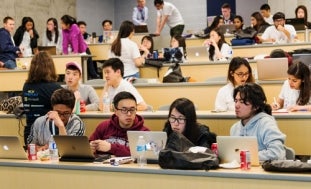 Winners of inaugural Equithon were: Raphael Tang and Joey Cam for their program that translates complex English sentences to simple phrases to empower people who have limited literacy or for whom English is a second language. They competed under the Poverty & Equity challenge set.
Winners of inaugural Equithon were: Raphael Tang and Joey Cam for their program that translates complex English sentences to simple phrases to empower people who have limited literacy or for whom English is a second language. They competed under the Poverty & Equity challenge set.
Finalists in the category of Gendered Racism were: Aditya Tharral, Colin Marsch, Lucas Liepert, and Soumya Chaudhari. Finalists in the category of Mental Health were: Meng Dong, Cheng Ji, Lin Ai, and Ena Yu. Finalists in the category of Physical Disabilities were: Nikola Valcic, Leanne Stuive, Sukhpreet Chuhan, and Ioan Dan Tataru. Finalists in the category of Women Empowerment were: Qi Shu, Lu Wang, Xidong Chen, and Dongchen Tang.

Read more
Here are the people and events behind some of this year’s most compelling Waterloo stories
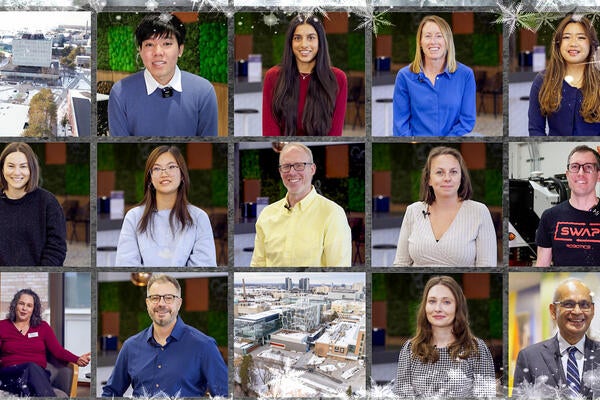
Read more
A winter holiday message from President Vivek Goel
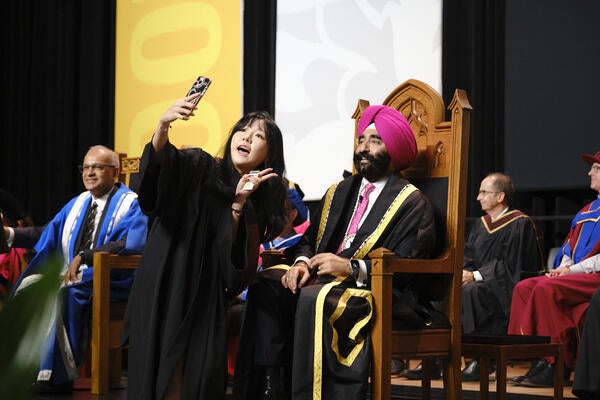
Read more
Waterloo welcomes 2,800 new graduates to its alumni club and celebrates their bold new journeys
The University of Waterloo acknowledges that much of our work takes place on the traditional territory of the Neutral, Anishinaabeg, and Haudenosaunee peoples. Our main campus is situated on the Haldimand Tract, the land granted to the Six Nations that includes six miles on each side of the Grand River. Our active work toward reconciliation takes place across our campuses through research, learning, teaching, and community building, and is co-ordinated within the Office of Indigenous Relations.